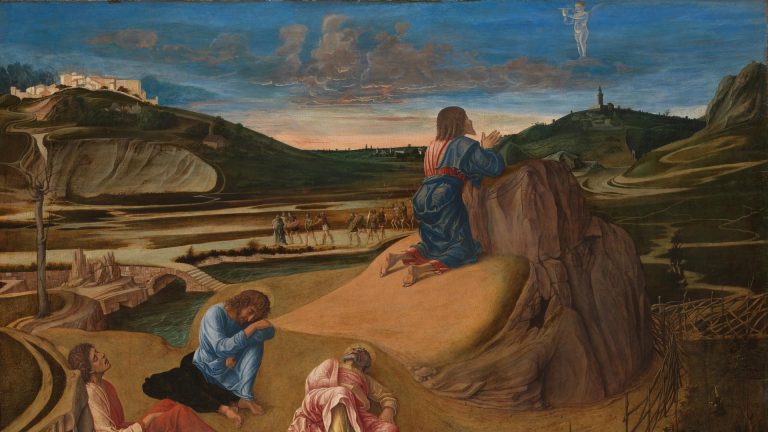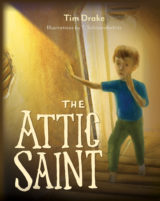By Tim Drake
Tim Drake serves as executive director of Pacem in Terris Hermitage Retreat Center. An award-winning author and former journalist, his books include The Attic Saint, Behind Bella, and the children’s coloring books Viva Cristo Rey! and From an Angel in a Dream. He resides in St. Joseph, Minnesota with his wife and children.

"Some of us need to discover that we will not begin to live more fully until we have the courage to do and see and taste and experience much less than usual. . . . There are times when in order to keep ourselves in existence at all we simply have to sit back for a while and do nothing. And for a man who has let himself be drawn completely out of himself by his activity, nothing is more difficult than to sit still and rest, doing nothing at all. The very act of resting is the hardest and most courageous act he can perform." —Thomas Merton
In my role as the director of a silent hermitage retreat center, I am convinced that if there is one area where many of Christ’s followers neglect to imitate Him, it is in the regular practice of going away to a deserted place to spend time in silence with Our Creator. We imitate Him in other ways. We’re baptized. We participate in the re-presentation of the Lord’s Supper each Sunday. We receive Christ through His Word and the Eucharist. We practice charity, supporting others in need. But many, many of us fail to imitate Christ in the practice of withdrawing regularly as He did, to the desert, and as he invited his disciples to do as well.
“Come away by yourselves to a desolate place and rest a while,” Jesus invites his disciples in Mark 6:31.
It’s not uncommon for hermit guests to have 3, 7, 10, or even 20 years between their most recent and previous visit to our retreat center. When I ask them why, they often say similar things—work, children, or busy-ness. In our busy-ness, we convince ourselves that we are in charge and that all that is happening is because of us. It is precisely at those times—when we are most busy and believe we cannot possibly withdraw—that we should. It is at those times when we are most in need of a reminder that we are not the center of all things.
By withdrawing, we first humbly acknowledge that God is God, and we are not. We rest. Many, many guests recount that one of the first things they do when they arrive is fall asleep—and they often recount sleeping 12 or 14 hours. Our founder called that “holy rest.” Our bodies and minds are weary from the pace we keep. At the very least, in silence, we can do nothing but let God love us.
Silence, then opens us up to God, who Himself is silent. Scripture tells us that He speaks in the silence. It opens us up to the life of faith and to the Holy Spirit’s workings and promptings in our own life.
“There is no one gentler than God in revealing ourselves to ourselves,” a guest once told me. It’s very true.
Recently, a twenty-year-old young man came on hermitage. Upon his departure, I spoke with him, asking him about his experience. He remarked, “The first thing I was struck by was that once the sun set, there were no screens.” His reference to the tablet, computer, television, and telephone screens which have become omnipresent was a seeming revelation to him. The devices, no matter which they are, are a constant noise.
In fact, many of us would rather do most anything aside from being in silence.
"Those who are most uncomfortable with the nonactivity of retreat are probably most addicted to activity as a way of avoiding inner emptiness and shoring up their sense of self with external accomplishments,” writes Ruth Haley Barton.
I recall one young woman who came as a hermit, but left early. When I inquired if anything was wrong, she replied, “I have never had this much silence in my entire life.” I was left feeling deeply saddened upon her departure. I thought it tragic, recognizing that a life without silence is likely a life without God.
In my Emmaus Road illustrated children’s story, The Attic Saint there is a very deliberate line that many readers may simply breeze through. In that line, it states that “in the silence of the afternoon,” Leo would go to the library to read. It is there, in the silence, that Leo is led on his adventure to the attic. He is led by Christ, in the light shining forth through the home’s stained-glass dove window, and the Holy Spirit, which travels across the floor to the attic door. With childlike innocence, Leo decides to follow the dove and is led to the attic where he makes a discovery and has an encounter with transcendent beauty. Yet, his adventure begins with silence. In silence, he is predisposed to follow the Spirit’s lead.
And so it is with all of us. If you long to hear God’s voice, if you want to be led by the Spirit, if you’re wondering what God’s will is, take time to listen in silence. If you haven’t taken time for a regular silent retreat, I encourage you to schedule one. Your spiritual life depends upon it.
You Might Also Like

In The Attic Saint, a heartening tale for children of all ages, the wisdom and beauty of the Catholic faith shine brilliantly. Author Tim Drake’s inspired story is brought to life through Theodore Schluenderfritz’s vivid illustrations.